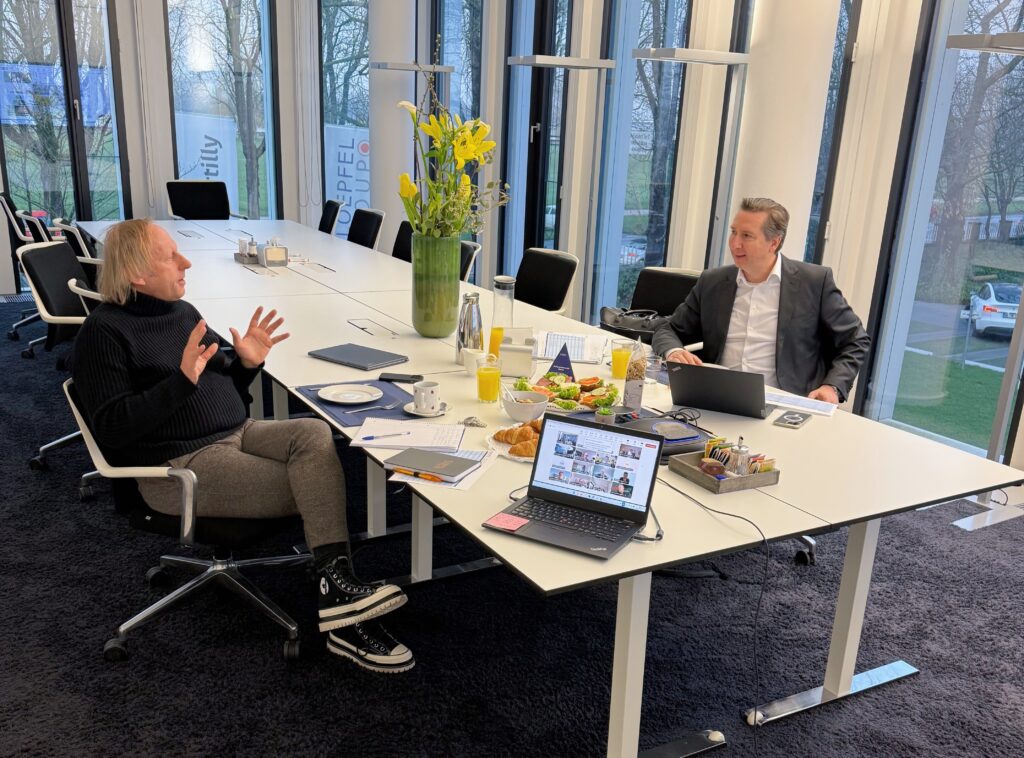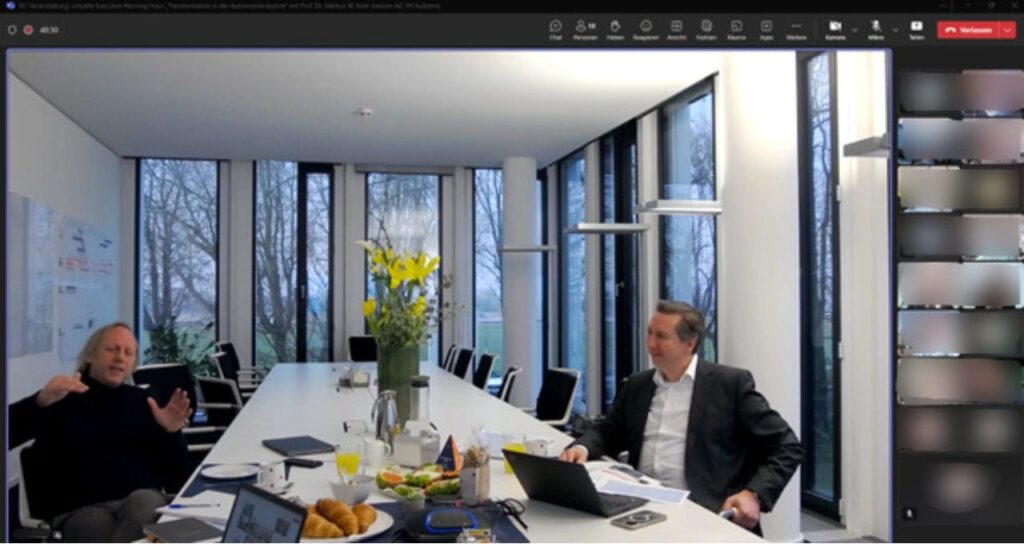Kloepfel Consulting recently hosted the online breakfast event “Executive Morning Hour – Transformation in the Automotive Industry” with Prof. Dr. Markus W. Exler (Partner, nexum AG). In this exclusive circle of top executives—including managing directors, board members, shareholders, and representatives of family businesses—the future of the industry was discussed in depth.
A key topic was the role of artificial intelligence (AI) as a driver of transformation. This article summarizes the most important insights, particularly regarding AI applications in the automotive sector.
Prof. Dr. Markus Exler provided a clear yet challenging analysis:
“The German automotive industry currently faces a margin problem. Overcapacity, the changing importance of the automobile, and weaker demand from China are major challenges.”
His appeal: “We must understand China better to remain competitive in the long run.”


The automotive industry is undergoing a profound transformation driven by political, economic, and technological changes. To remain competitive, the sector must reinvent itself. AI plays a key role in this transformation—whether in production, vehicle technology, or the entire value chain.
But AI’s potential extends far beyond that. It can provide valuable support in administrative processes by automating time-consuming routine tasks and helping decision-makers recognize complex relationships in vast amounts of market and company data. AI enables deeper insights, increases efficiency, and lays the foundation for sound strategic decisions.
How AI Is Transforming the Automotive Industry
Autonomous Driving and Driver Assistance Systems
AI allows vehicles to analyze their surroundings in real time, make independent decisions, and drive more safely. While Germany still faces regulatory challenges, autonomous driving systems are already in use in China and the USA.
Vehicles are now controlled by AI, but the use of artificial intelligence to manage businesses and optimize internal processes is still in its early stages. Companies are only just beginning to realize AI’s immense potential.
Optimization of Production Processes
AI-driven automation and robotics enhance manufacturing efficiency. Predictive maintenance helps identify failures early and minimizes production downtime—an essential advantage for suppliers struggling with rising costs.
Additionally, intelligent scheduling and automated production planning reduce setup costs. Many of these technologies were developed 25 years ago and have been a staple of large corporations since the 2000s. However, a major breakthrough today lies in improved interaction with systems: modern AI-driven assistance tools align predictive maintenance and production planning data more precisely with user goals.
Another key advantage is the increased accessibility of these technologies. Previously, such solutions were too costly for small and medium-sized enterprises, but today they can be customized and implemented cost-effectively. This leads to better results and tailored systems that meet the specific needs of each company.
Personalized Driving Experiences
Smart infotainment systems, voice control, and adaptive vehicle modes not only enhance comfort but also provide automakers with new ways to strengthen customer loyalty.
Supply Chain and Logistics Optimization
AI also helps companies manage global supply networks more efficiently. Intelligent algorithms optimize material flows, reduce costs, and allow for faster adjustments to market fluctuations. A significant advantage: AI can analyze economic news and market trends in real time, helping companies align their strategic direction accordingly. Many medium-sized businesses still rely on manually maintained Excel spreadsheets, whereas modern AI-powered solutions enable much faster and more precise data processing.
Kloepfel Consulting can develop customized AI solutions for clients that are ready for use within days.
AI as an Opportunity for the German Automotive Industry
Germany has a strong automotive tradition, but competition from China is growing. While AI-driven electric vehicles dominate the Chinese market, German manufacturers are lagging in digital transformation. To remain competitive, they need stronger cooperation with tech firms, improved software expertise, and fewer regulatory hurdles.
Moreover, a new legal requirement comes into play:
Since February 2, 2025, companies must train their employees in the use of AI whenever AI is integrated into their daily work. This applies not only to complex applications but also to simple tools like ChatGPT for text generation or Microsoft Copilot for support tasks.
To help companies meet this training obligation, Kloepfel Consulting has developed specialized video training on AI. These courses not only ensure compliance with legal requirements but also enhance employees’ efficiency and AI proficiency—an essential advantage for driving digital transformation from within.
AI as a Game-Changer in Procurement
AI is revolutionizing not just production and vehicle technology but also procurement. From intelligent demand forecasting and risk management to automated negotiations and supplier analysis, AI can make procurement more efficient and strategic.
→ Learn more about Kloepfel Consulting’s AI solutions!
Author

Contact
Kloepfel Group
Damir Berberovic
Tel.: 0211 941 984 33 | Mail: rendite@kloepfel-consulting.com
